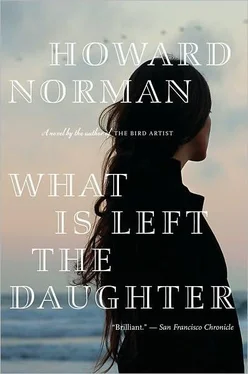Ballade & Fugue is open Fridays and Saturdays until ten P.M., and the other nights until six P.M. Randall's got plaster busts of the great composers on a shelf along the back wall (no Canadians). I sit on the sofa and listen to various gramophone records as customers come and go. Sometimes I attend the cash register while Randall and Helen have supper in a restaurant, usually at the Rex Hotel. On those occasions Randall always returns to the store within an hour and a half. For my birthday every year they give me a recording. This year, for my forty-third, it was Arcangelo Corelli, Violin Sonata opus 5—my first Corelli — and I went right back to my hotel and listened to it twice through.
However, it's not as if life hasn't offered some recent surprises. For instance, there's a pawnshop on Salter Street just off Hollis. It's called J. P.'s Pawn, the proprietor being J. P. MacPherson, who arrived through Pier 21 from Scotland. I couldn't tell you what the J. P. stands for. I'd passed by this shop more times than I can count. I'd looked in through the window and seen J. P. chatting up a customer. Seen the sign over her counter that reads NO BARGAINING — NO EXCEPTIONS! From what I'd noticed, she was not quite fifty, somewhat thick at the middle, with a shock of reddish hair and a no-nonsense, determined look. Then again, I'd never set foot in her pawnshop until about a year ago. On a freezing Saturday afternoon I was ten steps from her awning, which was sagging under snow — she should have rolled it up — when I saw her wielding a snow shovel out front. Suddenly she slipped and fell hard to the gutter. I stepped right up and said, "Can I help you there?"
"I don't know, can you?" she said.
She allowed me to take her by the elbow and help lift her to her feet. The sleeves of her overcoat were soaked with dirty slush. "Thank you," she said. "As you can see, we've got a lot of fine merchandise in the window." Quick back to business like that. When J. P. MacPherson went into her shop, my eyes immediately fell on a display of five radios, front and center in the window. And I confess, Marlais, that even at my age, I almost burst into tears right there on the public sidewalk. There was an Emerson Snow White model, a Majestic with a Charlie McCarthy decal, an RCA from the San Francisco Expo, an RCA Victor La Siesta and a Stewart Warner set with a decal of the Dionne quintuplets.
Now, I realized that any number of these models had been manufactured. But I went inside and said to J. P. MacPherson, "I'd like to purchase all those radios in the window."
"This far away from Christmas?" she asked.
"They wouldn't be for gifts."
"I can take them out for your inspection, one by one or all at once," she said. "Which do you prefer?"
"All at once," I said.
"Fine."
She lined up the radios on the counter. I looked them over. "By any chance were there more radios brought in by the same person on the same day?" I asked. "Like these — not your everyday radios."
"That's short guesswork, all right," she said. "Yes. As a matter of fact there's more out back. Each and every one of real character. I take it you're a collector of sorts."
"May I see the others, please?"
It took about ten minutes for J. P. to produce twenty-three more radios, which now completely covered the counter.
"I've had these for quite a while," she said. "A number sold quickly. Then never sold, never sold, never sold, so I stuck them in back. I'd just put them on display again last week. Lucky me."
"Lucky both of us," I said.
"The man who originally brought these in, brought in fifty-eight radios altogether," she said. "You don't forget that, I guess."
"I know your sign says no bargaining, so I won't haggle over price," I said. "But I want to suggest a trade."
"What sort?" she asked.
"I'll agree to buy all twenty-eight if you tell me who pawned them in the first place."
She didn't hesitate an instant. She opened a drawer in a metal file cabinet and after a quick search lifted out an invoice. "Are you police?"
"My name is Wyatt Hillyer," I said. "I can give you a tele phone number to call to verify that I'm a detritus gaffer for the City of Halifax. Hold the radios for me. I'd give you a down payment right now. How's that?"
"So that's what you people are officially called, detritus gaffers," she said. "I've always wondered. I've seen your crew out in the harbor."
"We're pretty noticeable, I guess."
"Listen," she said, "if you ever find something that you deem pawnable—"
"We officially have to report everything," I said. "Most of what we find is broken or otherwise useless, but not all of it. For instance, we fished out a complete set of encyclopedias."
"No kidding," she said. "Well, you know where my shop is, just in case."
She studied the invoice a moment and said, "These radios were pawned by a Mr. Paulson Lessard, resident at 56 Robie Street, Halifax."
"Thank you," I said. "How about what I've got in my wallet, eighteen dollars, as a down payment?"
"That's a lot of money to carry around," she said. "Just come back Monday and it'll be in one bill of sale, what say?"
"I'm going to take the rare day off work to do just that," I said. "I'll start to feel in ill health when, do you think?"
J. P. laughed a little, like she was pleased to participate in such harmless chicanery, and said, "Well, Mr. Hillyer, you know your superiors and I don't. But to be convincing, I'd claim you woke to a raging fever about three A.M. Monday morning. Woke to a raging fever— be sure to use those exact words. If you're worried about being caught out on the street Monday, I can send my husband, Oliver Tecosky, over to wherever's your address. He'll have the radios and you can give him the money and sign the bill of sale."
"A pawnshop that makes house calls," I said. "That's something."
"Let me write down your address," she said.
"I've been at the Waverly Hotel for six months or so," I said. "Two Seventy-four Barrington."
She wrote down the address. "Let's see, banks open at nine, so how's eleven A.M.?"
"I'll be in the lobby."
"I can tell you're good for the money, Mr. Hillyer," she said.
"And I can tell you're good for a fair price," I said.
"Let me add another item of interest. I'm making one hundred percent profit off these radios, due to the fact that Mr. Lessard's met his Maker."
"How do you know that?"
"I generally believe the obituaries in the Mail. "
"Not every day a man pawns fifty-eight radios, eh?"
"It was memorable," she said. "You know what else? When Mr. Lessard first brought these radios in, he said he was going to use the money to travel down to New York City to stay in a hotel and go in person to see a live orchestra. The such-and-such orchestra, I can't recall."
Marlais, at that moment I had unforgiving thoughts toward Paulson Lessard, the cunning old bastard. I kept them to myself, though. J. P. didn't have to suffer them.
The following Monday, as promised, I met Oliver Tecosky, nice man, in the lobby, and after a few excursions up and down in the lift, within half an hour every last one of the radios was on my bed. He told me the price, I paid him in full, and he left, the whole time maybe ten words spoken between us. I percolated coffee and the telephone rang. I thought maybe it was Oliver Tecosky, that he'd forgotten a radio, but it happened to be the Waverly's accountant, Frances Banner. She reminded me that I was late three weeks in my rent. "That's not like you, Mr. Hillyer," she said. "Usually — according to my records, you're usually no more than two weeks late."
"Well, I've just put out a lot of money for twenty-eight radios," I said.
"Why on earth?"
"So I'm a bit overdrawn. Which means I can't pay my rent just yet," I said. "But I can put in overtime at work, and that's guaranteed."
Читать дальше












